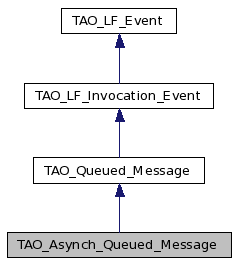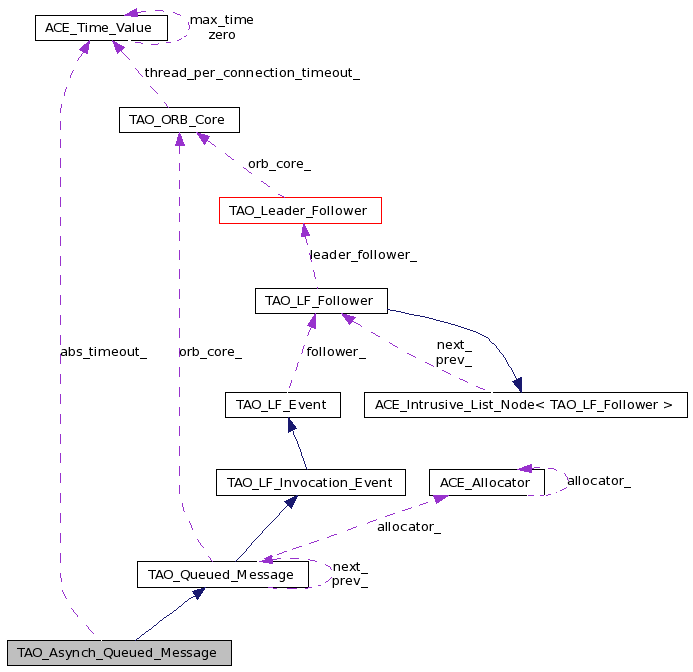
#include <Asynch_Queued_Message.h>
Inheritance diagram for TAO_Asynch_Queued_Message:


Public Member Functions | |
| TAO_Asynch_Queued_Message (const ACE_Message_Block *contents, TAO_ORB_Core *oc, ACE_Time_Value *timeout, ACE_Allocator *alloc, bool is_heap_allocated) | |
| Constructor. | |
| virtual | ~TAO_Asynch_Queued_Message (void) |
| Destructor. | |
Implement the Template Methods from TAO_Queued_Message | |
| virtual size_t | message_length (void) const |
| Return the length of the message. | |
| virtual int | all_data_sent (void) const |
| Return 1 if all the data has been sent. | |
| virtual void | fill_iov (int iovcnt_max, int &iovcnt, iovec iov[]) const |
| Fill up an io vector using the connects of the message. | |
| virtual void | bytes_transferred (size_t &byte_count) |
| Update the internal state, data has been sent. | |
| virtual TAO_Queued_Message * | clone (ACE_Allocator *alloc) |
| virtual void | destroy (void) |
| Reclaim resources. | |
| virtual bool | is_expired (const ACE_Time_Value &now) const |
| Check for timeout. | |
Protected Member Functions | |
| TAO_Asynch_Queued_Message (char *buf, TAO_ORB_Core *oc, size_t size, const ACE_Time_Value &abs_timeout, ACE_Allocator *alloc, bool is_heap_allocated) | |
| Constructor. | |
Private Attributes | |
| size_t const | size_ |
| The number of bytes in the buffer. | |
| size_t | offset_ |
| The offset in the buffer. | |
| char * | buffer_ |
| The buffer containing the complete message. | |
| ACE_Time_Value | abs_timeout_ |
Definition at line 39 of file Asynch_Queued_Message.h.
| TAO_BEGIN_VERSIONED_NAMESPACE_DECL TAO_Asynch_Queued_Message::TAO_Asynch_Queued_Message | ( | const ACE_Message_Block * | contents, | |
| TAO_ORB_Core * | oc, | |||
| ACE_Time_Value * | timeout, | |||
| ACE_Allocator * | alloc, | |||
| bool | is_heap_allocated | |||
| ) |
Constructor.
| contents | The message block chain that must be sent. | |
| alloc | Allocator used for creating this object. | |
| timeout | The relative timeout after which this message should be expired. |
Definition at line 19 of file Asynch_Queued_Message.cpp.
References ACE_NEW, ACE_High_Res_Timer::gettimeofday_hr(), and ACE_OS::memcpy().
00025 : TAO_Queued_Message (oc, alloc, is_heap_allocated) 00026 , size_ (contents->total_length ()) 00027 , offset_ (0) 00028 , abs_timeout_ (ACE_Time_Value::zero) 00029 { 00030 if (timeout != 0)// && *timeout != ACE_Time_Value::zero) 00031 this->abs_timeout_ = ACE_High_Res_Timer::gettimeofday_hr () + *timeout; 00032 // @@ Use a pool for these guys!! 00033 ACE_NEW (this->buffer_, char[this->size_]); 00034 00035 size_t copy_offset = 0; 00036 for (const ACE_Message_Block *i = contents; 00037 i != 0; 00038 i = i->cont ()) 00039 { 00040 ACE_OS::memcpy (this->buffer_ + copy_offset, 00041 i->rd_ptr (), 00042 i->length ()); 00043 copy_offset += i->length (); 00044 } 00045 }
| TAO_Asynch_Queued_Message::~TAO_Asynch_Queued_Message | ( | void | ) | [virtual] |
Destructor.
Definition at line 61 of file Asynch_Queued_Message.cpp.
References buffer_.
00062 { 00063 // @@ Use a pool for these guys! 00064 delete [] this->buffer_; 00065 }
| TAO_Asynch_Queued_Message::TAO_Asynch_Queued_Message | ( | char * | buf, | |
| TAO_ORB_Core * | oc, | |||
| size_t | size, | |||
| const ACE_Time_Value & | abs_timeout, | |||
| ACE_Allocator * | alloc, | |||
| bool | is_heap_allocated | |||
| ) | [protected] |
Constructor.
| buf | The buffer that needs to be sent on the wire. The buffer will be owned by this class. The buffer will be deleted when the destructor is called and hence the buffer should always come off the heap! | |
| oc | The ORB Core | |
| size | The size of the buffer <buf> that is being handed over. | |
| abs_timeout | The time after which this message should be expired. | |
| alloc | Allocator used for creating <this> object. |
Definition at line 47 of file Asynch_Queued_Message.cpp.
00053 : TAO_Queued_Message (oc, alloc, is_heap_allocated) 00054 , size_ (size) 00055 , offset_ (0) 00056 , buffer_ (buf) 00057 , abs_timeout_ (abs_timeout) 00058 { 00059 }
| int TAO_Asynch_Queued_Message::all_data_sent | ( | void | ) | const [virtual] |
Return 1 if all the data has been sent.
Implements TAO_Queued_Message.
Definition at line 74 of file Asynch_Queued_Message.cpp.
References offset_, and size_.
| void TAO_Asynch_Queued_Message::bytes_transferred | ( | size_t & | byte_count | ) | [virtual] |
Update the internal state, data has been sent.
After the TAO_Transport class completes a successful (or partially successful) I/O operation it must update the state of all the messages queued. This callback method is used by each message to update its state and determine if all the data has been sent already.
| byte_count | The number of bytes succesfully sent. The TAO_Queued_Message should decrement this value by the number of bytes that must still be sent. |
Implements TAO_Queued_Message.
Definition at line 93 of file Asynch_Queued_Message.cpp.
References TAO_LF_Event::LFS_ACTIVE, TAO_LF_Event::LFS_SUCCESS, offset_, size_, and TAO_LF_Invocation_Event::state_changed_i().
00094 { 00095 this->state_changed_i (TAO_LF_Event::LFS_ACTIVE); 00096 00097 size_t const remaining_bytes = this->size_ - this->offset_; 00098 if (byte_count > remaining_bytes) 00099 { 00100 this->offset_ = this->size_; 00101 byte_count -= remaining_bytes; 00102 return; 00103 } 00104 this->offset_ += byte_count; 00105 byte_count = 0; 00106 00107 if (this->all_data_sent ()) 00108 this->state_changed (TAO_LF_Event::LFS_SUCCESS, 00109 this->orb_core_->leader_follower ()); 00110 }
| TAO_Queued_Message * TAO_Asynch_Queued_Message::clone | ( | ACE_Allocator * | alloc | ) | [virtual] |
Implements TAO_Queued_Message.
Definition at line 114 of file Asynch_Queued_Message.cpp.
References ACE_DEBUG, ACE_NEW_MALLOC_RETURN, ACE_NEW_RETURN, LM_DEBUG, ACE_Allocator::malloc(), ACE_OS::memcpy(), offset_, size_, and TAO_debug_level.
00115 { 00116 char *buf = 0; 00117 00118 // @todo: Need to use a memory pool. But certain things need to 00119 // change a bit in this class for that. Till then. 00120 00121 // Just allocate and copy data that needs to be sent, no point 00122 // copying the whole buffer. 00123 size_t const sz = this->size_ - this->offset_; 00124 00125 ACE_NEW_RETURN (buf, 00126 char[sz], 00127 0); 00128 00129 ACE_OS::memcpy (buf, 00130 this->buffer_ + this->offset_, 00131 sz); 00132 00133 TAO_Asynch_Queued_Message *qm = 0; 00134 00135 if (alloc) 00136 { 00137 ACE_NEW_MALLOC_RETURN (qm, 00138 static_cast<TAO_Asynch_Queued_Message *> ( 00139 alloc->malloc (sizeof (TAO_Asynch_Queued_Message))), 00140 TAO_Asynch_Queued_Message (buf, 00141 this->orb_core_, 00142 sz, 00143 this->abs_timeout_, 00144 alloc, 00145 true), 00146 0); 00147 } 00148 else 00149 { 00150 // No allocator, so use the common heap! 00151 if (TAO_debug_level == 4) 00152 { 00153 // This debug is for testing purposes! 00154 ACE_DEBUG ((LM_DEBUG, 00155 "TAO (%P|%t) - Asynch_Queued_Message::clone\n" 00156 "Using global pool for allocation \n")); 00157 } 00158 00159 ACE_NEW_RETURN (qm, 00160 TAO_Asynch_Queued_Message (buf, 00161 this->orb_core_, 00162 sz, 00163 this->abs_timeout_, 00164 0, 00165 true), 00166 0); 00167 } 00168 00169 return qm; 00170 }
| void TAO_Asynch_Queued_Message::destroy | ( | void | ) | [virtual] |
Reclaim resources.
Reliable messages are allocated from the stack, thus they do not be deallocated. Asynchronous (SYNC_NONE) messages are allocated from the heap (or a pool), they need to be reclaimed explicitly.
Implements TAO_Queued_Message.
Definition at line 173 of file Asynch_Queued_Message.cpp.
References ACE_DES_FREE.
00174 { 00175 if (this->is_heap_created_) 00176 { 00177 // If we have an allocator release the memory to the allocator 00178 // pool. 00179 if (this->allocator_) 00180 { 00181 ACE_DES_FREE (this, 00182 this->allocator_->free, 00183 TAO_Asynch_Queued_Message); 00184 00185 } 00186 else // global release.. 00187 { 00188 delete this; 00189 } 00190 } 00191 }
| void TAO_Asynch_Queued_Message::fill_iov | ( | int | iovcnt_max, | |
| int & | iovcnt, | |||
| iovec | iov[] | |||
| ) | const [virtual] |
Fill up an io vector using the connects of the message.
Different versions of this class represent the message using either a single buffer, or a message block. This method allows a derived class to fill up the contents of an io vector, the TAO_Transport class uses this method to group as many messages as possible in an iovector before sending them to the OS I/O subsystem.
| iovcnt_max | The number of elements in iov | |
| iovcnt | The number of elements already used by iov, this method should update this counter | |
| iov | The io vector |
Implements TAO_Queued_Message.
Definition at line 80 of file Asynch_Queued_Message.cpp.
References ACE_ASSERT, buffer_, offset_, and size_.
00083 { 00084 ACE_ASSERT (iovcnt_max > iovcnt); 00085 ACE_UNUSED_ARG (iovcnt_max); // not used if ACE_ASSERT() is empty 00086 00087 iov[iovcnt].iov_base = this->buffer_ + this->offset_; 00088 iov[iovcnt].iov_len = static_cast<u_long> (this->size_ - this->offset_); 00089 ++iovcnt; 00090 }
| bool TAO_Asynch_Queued_Message::is_expired | ( | const ACE_Time_Value & | now | ) | const [virtual] |
Check for timeout.
| now | Pass in the current time using ACE_High_Res_Timer::gettimeofday_hr(). This is a parameter in order to avoid calling gettimeofday_hr() inside of this method (which will be called in a tight loop). |
Reimplemented from TAO_Queued_Message.
Definition at line 194 of file Asynch_Queued_Message.cpp.
References abs_timeout_, and ACE_Time_Value::zero.
00195 { 00196 if (this->abs_timeout_ > ACE_Time_Value::zero) 00197 { 00198 if (this->offset_ > 0) 00199 { 00200 return false; //never expire partial messages 00201 } 00202 return this->abs_timeout_ < now; 00203 } 00204 return false; 00205 }
| size_t TAO_Asynch_Queued_Message::message_length | ( | void | ) | const [virtual] |
Return the length of the message.
If the message has been partially sent it returns the number of bytes that are still not sent.
Implements TAO_Queued_Message.
Definition at line 68 of file Asynch_Queued_Message.cpp.
References offset_, and size_.
char* TAO_Asynch_Queued_Message::buffer_ [private] |
The buffer containing the complete message.
Definition at line 116 of file Asynch_Queued_Message.h.
Referenced by fill_iov(), and ~TAO_Asynch_Queued_Message().
size_t TAO_Asynch_Queued_Message::offset_ [private] |
The offset in the buffer.
Data up to offset has been sent already, only the [offset_,size_) range remains to be sent.
Definition at line 113 of file Asynch_Queued_Message.h.
Referenced by all_data_sent(), bytes_transferred(), clone(), fill_iov(), and message_length().
size_t const TAO_Asynch_Queued_Message::size_ [private] |
The number of bytes in the buffer.
Definition at line 106 of file Asynch_Queued_Message.h.
Referenced by all_data_sent(), bytes_transferred(), clone(), fill_iov(), and message_length().
 1.4.7
1.4.7